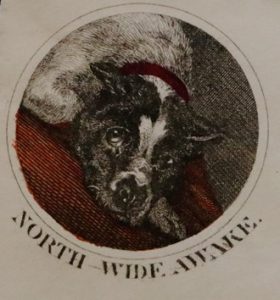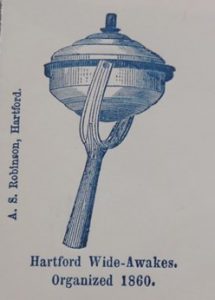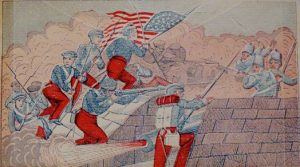Marching Societies Transform 1860 Election
Emerging Civil War welcomes back guest author Leon Reed….
The 1860 presidential election aroused more passion than any presidential election before or since. Four regional candidates: former congressman Abraham Lincoln, US senator Stephen Douglas, vice president John Breckinridge, and recently retired US senator John Bell competed in what amounted to two regional elections: Lincoln v. Douglas in the north, Breckinridge v Bell in the South. More than 80% of eligible voters went to the polls, a higher percentage than any election other than the Hayes-Tilden contest in 1876.
 The rallies in this election were particularly intense. One feature of many rallies was the “marching society,” which, when successful, mobilized youth, controlled crowds, and intimidated opponents. The most successful, by far, was the “Wide Awake” movement, which supported Lincoln’s candidacy.
The rallies in this election were particularly intense. One feature of many rallies was the “marching society,” which, when successful, mobilized youth, controlled crowds, and intimidated opponents. The most successful, by far, was the “Wide Awake” movement, which supported Lincoln’s candidacy.
This movement was launched in March 1860 by five young clerks in Connecticut and grew to more than 100,000 members and spread to every northern city and state. It was a “marching society” whose members wore capes and military caps. They carried torches as they marched silently. The name came from a January 1860 newspaper story, saying the state’s Republicans were wide awake and ready for the upcoming election.

Rowdy groups had paraded (and fought) in previous campaigns, but the Wide Awakes were different because of their marching discipline and military display. They were a feature at almost every Lincoln rally. The New York Times described a Wide Awake rally:
Far as the eye could reach extended the files of men bearing torches and fireworks, while for hours the roar of explosions, the confused din of many bands of music, the shouts and cheers for the candidates, and the general excitement reminded one of a Venetian Carnival … each man in the procession bore a blazing light of some kind. … The men were drilled in marching, and that, with the neat, uniformly glazed caps and capes, made their regular appearances quite pleasing, while their systematic cheering produced quite a moral effect.[1]
While fights broke out at many of their marches and rallies, they weren’t explicitly a violent group. The militance of the Wide Awakes frightened many southerners.
“… many panicked southerners interpreted the movement as confirmation of their fears of northern coercion. … It is clear, however, that the Wide Awakes fundamentally altered the tone of the campaign. They took a muddled political environment and turned it into one of the most excited elections in American history. Through marches, speeches, editorials, advertisements, cartoons, jokes, and brawls, the Wide Awakes triggered massive popular enthusiasm in the summer and fall of 1860. … By energizing the tone of the campaign, the Wide Awakes had a major impact on how Americans interpreted Lincoln’s victory in the days and weeks between election and secession. By the end of 1860, the nation was wide awake.”[2]

Other campaigns tried to imitate the Wide Awakes. Douglas had the “Little Giants” (Douglas’s nickname) or the Chloroformers (to put the Wide Awakes to sleep). Breckinridge had the Chapultapecs (a battle in the Mexican war where both Breckinridge and his running mate had fought, see below). Bell’s campaign organized the Minute Men and the Bell Ringers. But like the campaigns they represented, the other marching societies never could match the Wide Awakes.
Although political clubs usually disbanded once the election was held, the Wide Awakes carried on into the secession crisis, beginning military training in some cities after the firing on Fort Sumter.
[1] “The Connecticut Campaign,” New York Times, March 29, 1860.
[2] John Grinspan, “’Young Men for War’: The Wide Awakes and Lincoln’s 1860 Presidential Campaign,” Journal of American History, 96, September 2009.
I don’t remember the source, but I thought the Wide Awakes got their name from their oilcloth capes, because the material had “no knaps” or tufts of fuzz. If you had no knap/nap, you must be wide awake.?
This is a solid introduction to the political marching organizations that formed in order to take a more active role in the Presidential selection and election process of 1860. Formed in response to an attempted assault on Republican Cassius Clay, the Wide Awakes adopted Abraham Lincoln as their candidate when he visited Connecticut in March 1860. And as the strength of Lincoln’s candidacy grew, so did the Wide Awake movement…
In response, the Democrats attempted a number of mirror organizations; and arguably the most successful of these in the South were the Minute-men.
The Minute-men of the South even had their own song: https://www.loc.gov/item/ihas.200002493/